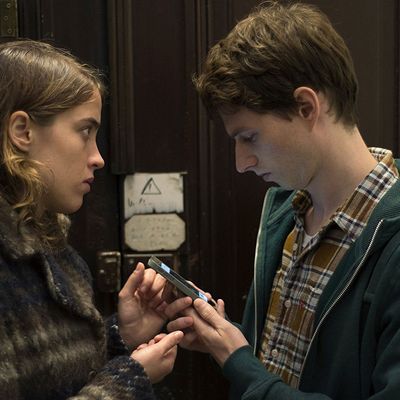
The Dardenne brothers of Belgium, Jean-Pierre and Luc, are masters of the traveling close-up. They trail their protagonists through the day, alternately studying them and seeing the world through their eyes, zeroing in as their characters are forced to make tough moral choices in a society founded on inequality. ItÔÇÖs a formula of sorts, but the protagonists differ and so do the settings and people on the periphery. The constant is the brothersÔÇÖ view of human nature. YouÔÇÖre free to choose good, they suggest, no matter how much our economic system pressures you to believe (and do) otherwise.
Their protagonist in The Unknown Girl is not the title character but a dedicated clinic physician named Jenny Davin (Ad├¿le Haenel). Early on, she tells her green intern, Julien (Olivier Bonnaud), to set firm limits when it comes to patients. ÔÇ£A doctor has to control his emotions,ÔÇØ she says. ÔÇ£DonÔÇÖt let patients tire you or you wonÔÇÖt make a proper diagnosis.ÔÇØ On cue, the office doorbell rings and she orders Julien not to answer ÔÇö itÔÇÖs after hours. The next morning, the girl who rang is found dead. Jenny is stricken. Her limits have come back to bite her on the ass.
The set-up is perfunctory for the Dardennes, who usually take longer to put their characters to the test. In this case, the protagonistÔÇÖs choice was made early and really, really badly, and all thatÔÇÖs left now is for Jenny to seek atonement. Given a lack of interest on the part of the police, she plays junior detective in hope of learning the name of girl, who was young and black and had no identification.
ItÔÇÖs the mystery ÔÇö and the danger that Jenny puts herself in ÔÇö that keeps you hooked. But what makes this a Dardennes film is how she pokes around between medical duties. Now sheÔÇÖs wandering into a scuzzy pick-up site for prostitutes, now sheÔÇÖs making house calls. On one occasion, she treats an old man who refuses to talk to her about the unknown girl ÔÇö which naturally softens him. She turns out to have diagnostic ties to other suspects, too ÔÇö enough to make you think that all P.I.s should consider medical training. People spill when youÔÇÖve got your fingers on their pulse.
The scaffolding is too much on the outside here: the antithesis line (ÔÇ£a doctor has to control his emotionsÔÇØ), the death of the girl, the decision that Jenny must make about leaving her indigent patients and joining a lucrative practice. And the solution is too convenient, at least for this avid reader of pulp mysteries. The best Dardennes movies ÔÇö Rosetta, The Son, Two Days One Night ÔÇö keep you wondering longer what the central dramatic conflict will be.
But every Dardennes movie is worth seeing, and The Unknown Girl has all kinds of gripping undercurrents. You donÔÇÖt catch Ad├¿le Haenel acting. SheÔÇÖs too busy seeing the world as Jenny would ÔÇö as an endless line of people to be healed. The heart of the film is a dilemma for even the most determined do-gooder that can never be dramatized enough: At what point must oneÔÇÖs heart be hardened to be able to continue to function? I suspect that the Dardennes couldnÔÇÖt begin to answer that question in the abstract. Their movies make clear that there is no abstract, only people, each of them desperate in his or her own way.


